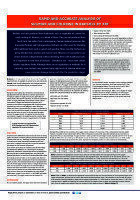Analytical instrumentation
Rapid and Accurate Analysis of Sulphur and Chlorine in Biofuels by XRF
Dec 08 2021
Author: XOS on behalf of XOS
Biofuels are fuels produced from feedstocks such as vegetable oil, animal fat, used cooking oil, biomass, or a blend of these. They are not produced from fossil fuels, but rather from contemporary, human-induced processes like transesterification and hydrogenation. Biofuels are often used for blending with traditional fuels such as gasoil and gasoline. More recently, biofuels are being blended into aviation and marine fuels. However, it is possible to use certain biofuels independently without blending them with traditional fuels. It is important to note that all biofuels – blended or not – must meet certain sulphur regulatory limits. Although there are no regulations or methods for it currently, some biofuels may contain fairly high levels of chlorine which can cause corrosion damage during and after the production stages.
In this study, we will use Sindie +Cl to test sulphur and chlorine in eight real-world samples, including both first and second-generation biofuels as well as the traditional biofuels they are typically blended with.
Digital Edition
PIN 26.1 Feb/Mar 2025
March 2025
Analytical Instrumentation - Elemental Analysis for Quality and Process Control at Refineries, for Lubricants and Wear Metals in Engine Oils - Synthetic Lubricants: New Developments - Scaling...
View all digital editions
Events
Apr 15 2025 Moscow, Russia
Apr 22 2025 Hammamet, Tunisia
Apr 22 2025 Kintex, South Korea
Solar & Energy Storage Summit 2025
Apr 23 2025 Denver, CO, USA
Apr 27 2025 Portland, OR, USA















